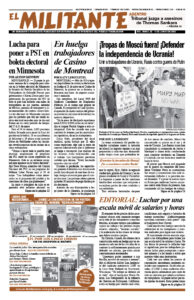President Joseph Biden’s May 20-24 trip to Asia comes amid increasing calls in the press and Congress for the White House to return to making its top foreign-policy priority countering Beijing’s rising economic clout and the growing reach of its military. This puts discussion with the rulers of Japan, South Korea, Australia and other Asian allies high on their agenda.
Democrats and Republicans both present their foreign policies as a defense of “American interests.” In fact, they act to safeguard the interests of the U.S. capitalist rulers who are preparing for sharper conflicts with rivals and future wars to defend their profits and strategic interests in the face of the growing capitalist world disorder following Moscow’s invasion of Ukraine.
Over recent decades the Chinese rulers’ massive expansion of capitalist production and trade has challenged Washington’s domination of markets and investments, especially in Asia and the Pacific. Tariffs on China, imposed by former President Donald Trump, are slowing Beijing’s rise. They have been continued by the Biden administration.
Though far short of the military armaments and capabilities of Washington, China’s rulers have poured huge sums into expanding their military in the region. In April, Beijing secured a deal with the rulers of the Solomon Islands that could allow it to station troops there. For years the Solomon Islands have been a semicolony of the Australian rulers, punctuated by occasional detachments of troops led by Canberra.
Beijing is also negotiating deals with the governments of additional island nations, including Kiribati, located just 1,800 miles from Hawaii, the home to the U.S. Indo-Pacific Command.
Biden’s trip highlighted the challenges facing the U.S. rulers. The centerpiece of his visit was launching the Indo-Pacific Economic Framework, a Washington-dominated trade pact that includes the governments of Australia, India, Japan and nine other countries in the region.
Aimed at strengthening economic ties among them and countering Beijing, the deal offered little that was tangible to the ruling classes signing onto it. It doesn’t provide any of them with greater access to U.S. markets, nor lay out proposals aimed at reducing their own tariffs. As part of the deal the White House dangled $150 million for clean energy and infrastructure projects in the region — a pittance compared to recent investments by Beijing.
Beijing has extended massive loans for giant infrastructure projects in countries across the region aimed at expanding trading routes and gaining access to markets for the Chinese capitalists’ commodities. Chinese trade with nations making up the Association of Southeast Asian Nations dwarfs that of the U.S.
A May 24 meeting of officials from Australia, India, Japan and the U.S. during Biden’s tour exposed some of the differences in their national interests. A joint statement released following the meeting referred to “a tragic conflict raging in Ukraine,” without condemning Moscow’s invasion.
Moscow-Beijing joint war games
On the final day of Biden’s trip, Chinese and Russian armed forces held their first joint military exercise since Moscow’s invasion of Ukraine, sending bombers over the seas of northeast Asia in a show of force. A U.S. official condemned the war games, saying they threatened countries in the region that had territorial disputes with Beijing. Over the last decade Beijing has conducted dozens of joint military exercises with Moscow, including mock seizures of islands, patrols by long-range bombers over the Sea of Japan and East China Sea.
At a meeting between Russian President Vladimir Putin and Chinese President Xi Jinping last February, they declared a “no limits” partnership. Putin reaffirmed Moscow’s support for Beijing’s claim that Taiwan is part of China. Xi has refused to condemn Moscow’s invasion of Ukraine.
Biden kicked off the Southeast Asia tour in South Korea, where the U.S. stations 28,500 troops. With newly elected President Yoon Suk Yeol, Biden agreed to discuss expanding provocative joint U.S.-South Korean military exercises. These war games threaten North Korea and worsen tensions across the Korean Peninsula.
In Tokyo May 23, Biden pledged to use the U.S. military to defend Taiwan, remarks the White House quickly walked back, insisting that the U.S. decades-old policy toward Chinese claims on Taiwan remained in place. Under the policy of “strategic ambiguity” Washington sells arms to Taiwan and at the same time acknowledges Beijing’s claim that Taiwan is part of China.
Despite their rising regional power in recent years, the Chinese rulers also face difficulties. Industrial production in China fell sharply last year and many cities remain under harsh pandemic lockdowns, stirring angry protests among residents. Loans made by Beijing to governments across Asia, as part of its expansionist Belt and Road Initiative, have become difficult, if not impossible, for some debtor nations to repay amid spreading social and economic crisis.

